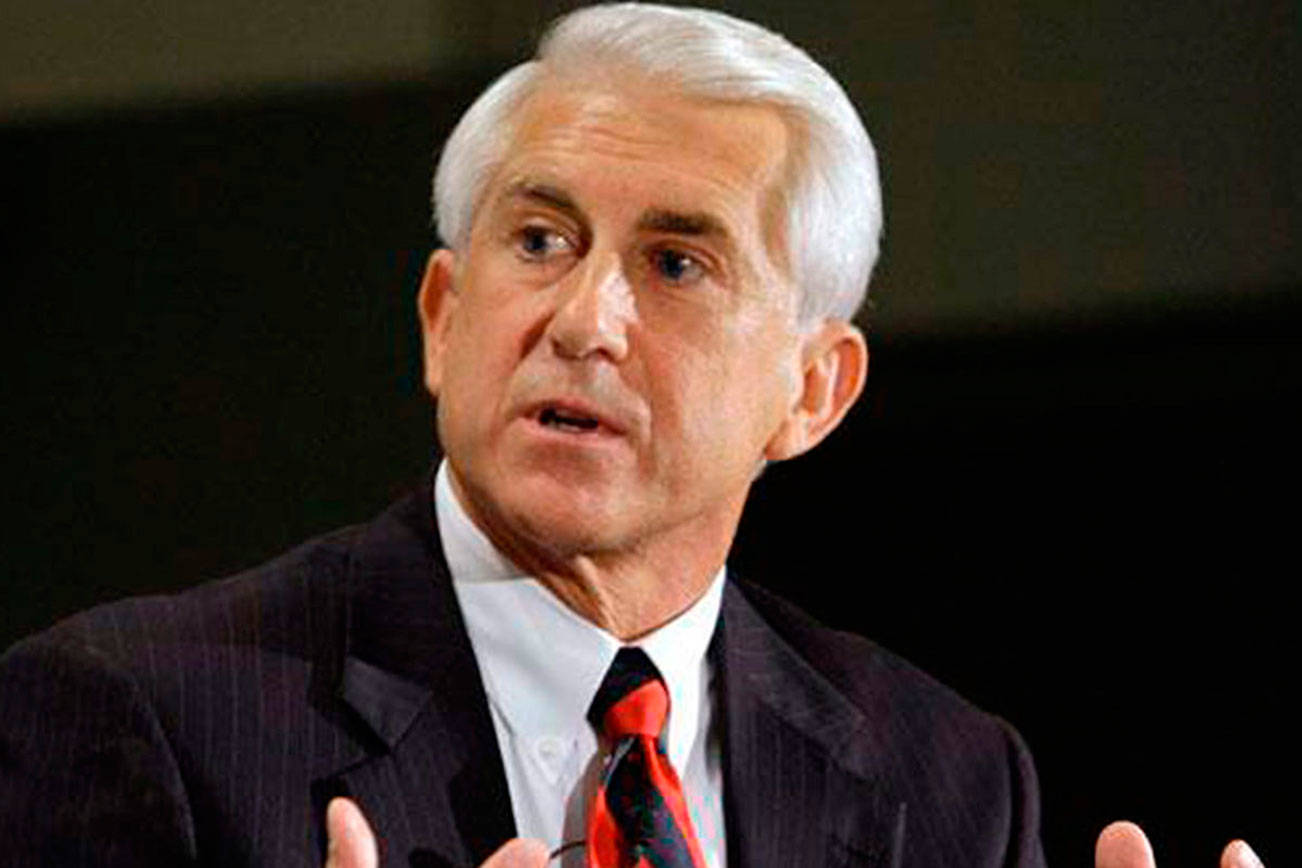Facing the prospect of a tough campaign, U.S. Rep. Dave Reichert announced on Wednesday that he is no longer seeking re-election next year. His announcement caught local politicos off guard, and threw the already-contested race’s future into turmoil.
“I don’t think anybody expected this,” said Washington GOP chair Susan Hutchison, adding that Reichert gave her a heads-up before announcing publicly. Hutchison says while there’s no plan yet for how to replace Reichert, there are plenty of Republicans in District 8 already elected to state or local government positions who could step up.
“There are an awful lot of people who will probably be examining that opportunity in the coming weeks,” she said.
Democratic political consultant Ben Anderstone says Democrats could give Republicans a run for their money in the 8th, which the GOP has held since it was first created following the 1980 US Census. “A lot of voters who came out for Trump…are less motivated this year, less excited,” said Anderstone, now that their candidate is in the White House. “And they don’t like Congress. Trump has gone around attacking the Republican congress at nearly every opportunity he gets.”
The dynamic Anderstone predicts would be comparable to what happened with Democratic voters in 1994 (the first midterm after Bill Clinton’s election) and 2010 (the first midterm after Barack Obama’s election). In both midterm elections, Republicans took control of the House of Representatives in a landslide.
Anderstone points out that Hillary Clinton took the 8th District in the 2016 presidential election—a fact which already put WA-8 on a Democratic hit list of vulnerable congressional seats. And anti-Trumpers modelled on the Tea Party and calling themselves the Indivisibles have already been campaigning against Reichert (or rather, against his support for the President) for months.
Like the state GOP, the Indivisibles were also caught off-guard by Reichert’s announcement. “I’m pretty surprised,” said Chris Petzold, spokesperson for Indivisible Washington’s 8th. “And pretty proud. Our group has been targeting Dave Reichert since before Trump’s inauguration…We’ve been applying constant pressure for at least eight months.” For example, in February, roughly 1,000 people marched on rural roadsides to Reichert’s office in Issaquah to protest his support for President Trump.
While Reichert never endorsed Trump, FiveThirtyEight.com has quantified his congressional support for the President. Based on how people voted in WA-8 during last year’s presidential race, FiveThiryEight projected that the district’s Congressional Representative should vote in line with Trump’s position 59.4 percent of the time. In practice, Reichert votes in line with Trump 82.9 percent of the time.
As we reported earlier today, Reichert has said that run-ins with the Indivisibles have “degenerated into shouting, yelling, and screaming matches.” But the confrontational constituency seem to be getting results: under public pressure, Reichert ultimately voted against repealing the Affordable Care Act, aka Obamacare (although he did so too late to mollify the Indivisibles).
“If he was eyeing retirement,” says Anderstone, “it doesn’t surprise me he chose to do it before the 2018 midterms. You see a lot more retirements when incumbents are staring down tough reelection challenges.”
Now, with Reichert out, it’s a whole new ball game, says Anderstone. “This is suddenly a more competitive race…[Reichert’s] brand clearly was stronger than the national Republican brand,” he said. “Incumbents have some voters who trust them enough to cross over, but with two unknown quantities on the ballot,” he said, people tend to vote by party rather than candidate. “This is a much more tossup race, considering the [current political] environment and the district. I think both parties are going to take the race a lot more seriously.”
“Obviously, the Republicans are going to scramble to find somebody,” Anderstone said, so that primary voters don’t go ahead and nominate someone too conservative to compete for swing voters in the general election. “Their nightmare scenario is they get a big Trump supporter whom the primary voters like but the swing voters don’t like. They’ll be looking for…a moderate,” he said.
Hutchison brushed off the prospect of a Democratic replacement for Reichert. District 8 has “been drawn as a solidly Republican seat,” she said, referring to the geography of the district. “There are hopes among Democrats that they can change that…but this is not a seat they’ll be able to flip without something very unusual happening.” While Clinton won the district over Trump, Bill Bryant, the Republican nominee for governor, “won by a sizable margin” of 7.4 points last year over incumbent Jay Inslee in the district, she said. “That indicates people were voting for Republicans because they were Republicans,” she said, rather than preferring Reichert specifically.
District 8 stretches from Wenatchee and Ellensburg on the east side of the Cascade Mountains to Kent and Auburn in south King County. Reichert first won the seat in 2004, and has carried it by 20 points or more in each of his past three elections. In 2012, Barack Obama won the 8th District by 1.6 percentage points; in 2016, Hillary Clinton won it by 3.1 points.
Several Democrats had already announced their candidacy to replace Reichert before Wednesday’s announcement. Republican state senator Dino Rossi, who nearly beat Democrat Chris Gregoire for governor in 2004, reacted to the news by posting on his Facebook page that “Friends and supporters have already called to ask if I will run for the 8th District Congressional Seat. I won’t take long to make a decision…Everyone can see that Washington DC is broken.”
cjaywork@seattleweekly.com
In an earlier version of this post, Clinton’s margin of victory in WA-8 was calculated without including third-party candidates’ votes, which increased it by 0.1 percent.








